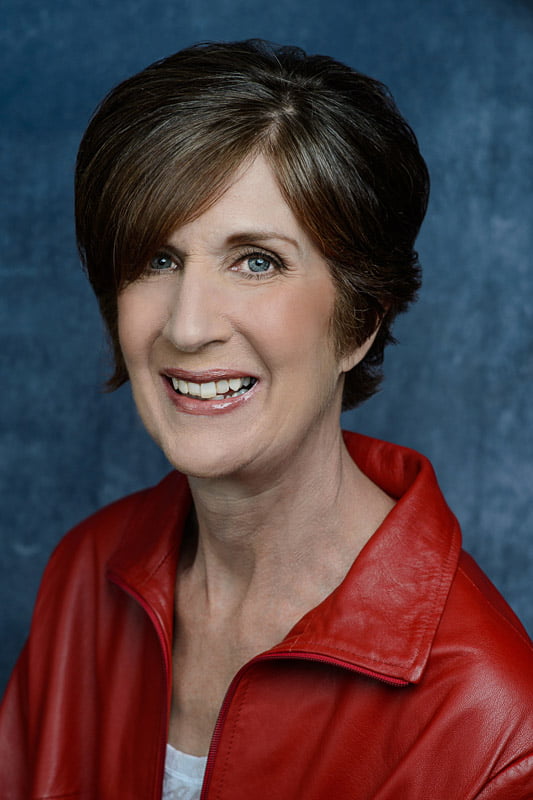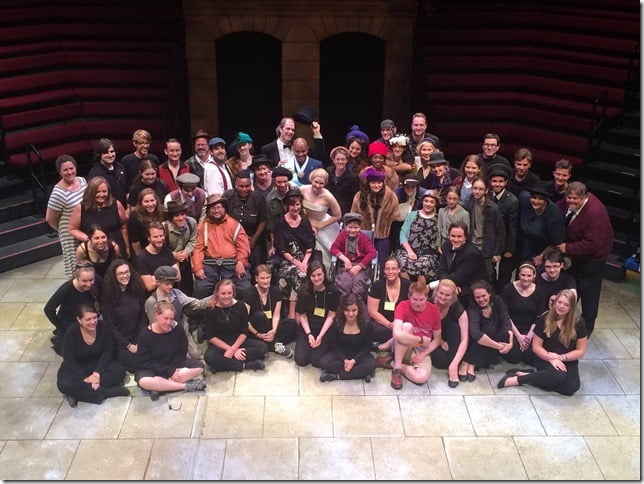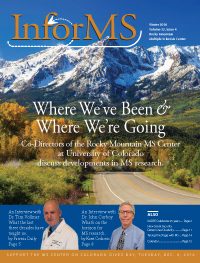MS treatment has changed a lot in 30 years – and with it, so has long-term prognosis. We’re beyond the days when MS was a terminal disease that led people down one particular path.
Instead, we’re living and thriving with MS in ways that may have seemed impossible in years past. Every person’s experience with MS is of course different, and no matter how your disease progresses, it certainly has an effect on your life.
In this issue of InforMS, we’d like to introduce you to Jill Leslie. Like many similar stories, Jill’s journey with MS has taken her a long way from the path she started on. But now it’s taken her full circle – back to her days in school theater.
Prologue
 Jill was 20 years old and attending college at University of Colorado in Boulder when she fell down some slippery, icy stairs. When she woke up in the morning, her left side wouldn’t move.
Jill was 20 years old and attending college at University of Colorado in Boulder when she fell down some slippery, icy stairs. When she woke up in the morning, her left side wouldn’t move.
“At that point, they gave me steroids at the hospital, and the doctor let me know that if it ever happened again, I needed to suspect that it was MS.”
Jill had a very common response to the suggestion of MS. At the time she didn’t really know what that meant. “I read as much as I could, but this was back in 1980 when there were no treatments and not much was known,” explains Jill.
With nothing but a single incident to go on, Jill moved on. “In those first 10 years, I had no problems. I was doing aerobics, running, and working a stressful job in public health. I talked my husband into getting a hot tub and that hot water seemed to heighten some of my symptoms. It didn’t take too long before I had another exacerbation. I had an MRI, and got a definite MS diagnosis.”
Act One
Jill was traveling a lot with her job including some international trips — at the Centers for Disease Control and Prevention in HIV/AIDS prevention. “It was very stressful work, but I loved it and was very passionate about it.”
One day she was shopping and couldn’t get out of the store. “I was sitting on the bench in the store because I couldn’t stand up to walk out. I thought to myself, ‘How am I going to get to my car?’”
“And that’s when I knew that it was time for a wheelchair,” says Jill. “They put me in a pretty purple electric wheelchair, but I didn’t have a vehicle to transport it, which is always a challenge. Once I got in my manual chair it was like having my independence back. I could do anything I could do before — I went to Africa in that chair, I went to Europe in that chair.”
Despite the changes brought on by her MS, Jill took on an even more stressful job — a regional position with the Assistant Secretary of Health and Human Services. Jill was a team leader and people sought her out for her experience and skill set.
Intermission
MS manifests in so many different ways, it’s hard to predict how it will affect your life. As her symptoms progressed, Jill focused on putting a great care team together.
When she came back to Denver from Georgia, she hit the ground running. “I had to search a little bit to find the right provider, which is so important. I found Dr. John Corboy and he got me on one of the DMTs. I was still doing some walking and I wasn’t using my chair all the time.”
Jill also started talking with Pat Daily at RMMSC to help her figure out the next chapter in her life when she was no longer able to work. “You need to have someone you can talk with about it,” Jill reflects, “I know people are resistant to therapy, but Pat has literally saved my life.”
With her team and treatment strategy in place, Jill knew her MS would continue to shape things to come. She finally made the tough decision to retire from her career. “My identity was my job – I loved it,” says Jill. “Being a leader, a teacher and a cheerleader for our work fueled me. Without that, what was next? I was really struggling: What was I going to do with myself?”
Jill weighed her options, and even considered running for elected office, “But I needed to be honest with myself: I’m not able to type for more than 10 minutes; I get up at 9 am and it takes me until 1 pm to get up, eat breakfast, feed the dog, and get dressed. And what job allows you to that?”
Act Two
Jill had always looked at things through a professional lens, so she stood back and looked at her whole life from the very beginning. She spent some time taking stock of the things that brought her joy in life. “I’d run out of all the tools in my work toolbox, so I thought about other toolboxes that I might have.”
“I started to think back to when I was a little girl — singing songs into a hairbrush just like every other little girl did at some point,” explained Jill. “It didn’t matter what we sounded like — good or bad, we all knew the words, and we all got the melody. So I just started thinking back on that phase and how much fun I had, but didn’t know how I could act on that.”
One afternoon, Jill was walking in a local park when gentleman recognized her and said, “Excuse me, is your name Jill? Did you go to Ranum High School and were you in Mr. Rogers’s drama class? I want to let you know I will never forget the scene you did in that play.”

Entering its 28th season in 2017, Phamaly is an award-winning Colorado-based theatre company that engages audiences in thinking about diversity, inclusion, and disability through the lens of theatre. Learn more at www.phamaly.org.
Photo by Michael Ensminger.
“I was very surprised, and, to be honest, I didn’t recall that play. He said he was with a theater company now, and asked me to see a production. I did that, but I didn’t follow up with him after that.”
Soon after that, Jill was at her retirement party when a longtime friend mentioned the Phamaly Theater group who explained that it was a theater company for a group of disabled actors. “At first, I was a little insulted. Why disabled actors? Why not a ‘regular’ theater group?”
Jill ended up going to the Denver Center for the Performing Arts (DCPA) to see a show. Two gentlemen came out of the same performance in their wheelchairs, and asked her if I was familiar with Phamaly. “I said I’d been hearing a lot about it lately, they told me more, and I thought — What do I have to lose?”
Jill contacted Phamaly and started taking classes and one of the actors encouraged her to audition. “Then you get into the fun parts of it! Headshots, makeup, and getting to be a part of something so special with so many great people.”
“When I opened the door to the rehearsal room, it was truly like opening the door to love. That’s the only way I can describe it. Everyone was so kind — telling me how nice it was to see a fresh face, saying that I have a beautiful smile. It was like that all night long.”
The community and camaraderie of Phamaly Theater was obvious from the start. “Whether I got a part or not, I just felt included, loved, and in a safe place.”
And it was so much fun. “At one point, the choreographer told me that they were going to do a dance including high kicks,” Jill remembers, “I looked at her and I just sort of flipped up the edge of my skirt and we both laughed. It was all about improvising — that’s what you do.” That improvisation paid off and Jill got a part in Phamaly’s production of Evita.
“Throughout the production, I got to know so many wonderful people – we developed great relationships and long-lasting connections,” says Jill. “We also have a Facebook group where we stay in touch and provide great support to one another.”
Encore
“When you are living with MS and particularly if it’s getting worse, you’re faced with a lot of loss. It brings on a lot of sorrow, and it’s not the cheeriest of lifestyles. So, it’s important to find something that brings happiness or puts a smile on your face, or a smile on someone else’s face, or brings a sense of accomplishment.”
Jill knows theater may not be the right fit for everyone, but it’s important everyone find something. “Maybe it’s fishing, or maybe it’s painting, or volunteering at a local community organization. It doesn’t have to be a super huge thing, but something that brings you a sense of fulfillment — a sense of ‘Wow, I did that.’“
“I think it’s important that people don’t feel they have to push themselves to ‘climb every mountain,’ as Julie Andrews would say. I don’t think that’s what she meant. For me, daily life presents a series of mountains, some as simple as just getting myself ready in the morning.”
“But we also have the opportunity to identify ‘mountains’ that we want to climb, not just the routine things we have to do,” says Jill. “Think about things you enjoy, and ways you can do them now, or over time, or in a modified way.”
“My Phamaly experience taught me so much. It was so much fun, it brought me new friendships, and gave me a sense of accomplishment,” says Jill. “And, for me, that’s the best kind of mountain in the world to conquer.”

